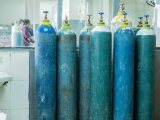While Pfizer has identified 65 injectable drugs that may be in short supply following extensive tornado damage at its Rocky Mount, North Carolina, plant on July 19, experts say most are available from other suppliers.
In a July 21 letter to US hospitals, Pfizer listed the 65 at-risk drugs by name and formulation. The list includes forms of epinephrine, fentanyl, heparin, lidocaine, and sodium chloride. The company said it didn't have an estimated date for resumption of drug production at the plant, but that it would "continue to fill orders of products for which we have inventory in the distribution chain at 100 percent of historical levels."
The Rocky Mount factory, which made a quarter of Pfizer's sterile injectables, was heavily damaged after a tornado made a 16-mile swath through the city. The warehouse, which housed raw materials, packing supplies, and finished medicines awaiting quality assurance, sustained the brunt of the damage. Production lines were unaffected, and no deaths or serious injuries were reported among the site's 3,200 workers.
The disaster comes at the same time as shortages of many critical drugs—including many sterile injectables produced by Pfizer—in the United States and other countries.
"Sterile injectable drugs are more frequently in shortage than other formulations due to them often having a more complex manufacturing process, fewer manufacturers, and strict regulatory requirements for quality control measures," said David Margraf, PharmD, PhD, pharmaceutical research scientist at the Resilient Drug Supply Project (RDSP), part of the University of Minnesota's Center for Infectious Disease Research and Policy (CIDRAP), publisher of CIDRAP News.
About half of drugs are essential
In response to the disaster, the US Pharmacopeia (USP) identified alternative drug suppliers and provided market-share data in a report. Contributors included Angels for Change, the End Drug Shortages Alliance, and the RDSP.
Their analysis of USP's Medicine Supply Map showed that more than 150 drugs are made at the Rocky Mount plant, and about half of them are on the Food and Drug Administration's (FDA's) Essential Medicines, Medical Countermeasures, and/or Critical Inputs list.
The report was meant to increase transparency into the drug supply chain so wholesalers can establish proactive allocations of affected drugs or alternatives, manufacturers can reserve stock for patient emergencies or increase production, and hospitals and other buyers can prioritize National Drug Codes (NDCs) for stewardship and low-waste protocols.
The document lists each drug, NDC, Pfizer US market share, US market share for the NDC, alternative suppliers, and its USP vulnerability score and indicates whether the medication is on the FDA's Essential Medicines list.
Allocations may lead to local supply disruptions
On July 21, Pfizer issued a press release saying that, amid the plant closure, crews were working 24/7 to restore power, assess the building's structural integrity, and move finished formulations to nearby storage facilities. The company said it is working with the FDA and local, state, and other federal officials to identify alternative sources of the damaged raw materials and supplies.
The same day, the FDA issued a press release saying, "We do not expect there to be any immediate significant impacts on supply given the products are currently at hospitals and in the distribution system, but this is a dynamic situation and FDA staff are in frequent communication with Pfizer and other manufacturers.
"Our initial analysis has identified less than 10 drugs for which Pfizer's North Carolina plant is the sole source for the U.S. market; however, a number of these are specific formulations for which there should be substitutes for which many weeks' worth of stock should be available in Pfizer's other warehouses."
To ensure equitable distribution of the affected drugs and availability to those who most need them, Pfizer has strictly allocated the inventory of many products, the FDA said. "These allocation measures could lead to localized supply disruptions depending on contractual relationships for supplies," it said. "Health care systems that have trouble in obtaining a particular drug should contact their distributor or Pfizer directly."
Our initial analysis has identified less than 10 drugs for which Pfizer's North Carolina plant is the sole source for the U.S. market; however, a number of these are specific formulations for which there should be substitutes for which many weeks' worth of stock should be available in Pfizer's other warehouses.
The affected drugs, which make up nearly 8% of all sterile injectables used in US hospitals, include anesthesia medications, painkillers, antibiotics, and neuromuscular blockers. The Rocky Mount plant, one of 10 US Pfizer manufacturing facilities, has operated since 1968 and also supplies medicines to other countries.
"Pfizer is also exploring alternative manufacturing locations for production across our significant manufacturing presence in the U.S. and internationally and across the company’s partner network," the Pfizer press release said.
Transparency into drug supply chain needed
Experts say that the tornado strike highlights the importance of a resilient and safe US drug supply chain in maintaining public health and national security. "Redundancy of manufacturing locations, which can include domestic locations, and of suppliers is important to mitigate risks to supply that can occur from natural disasters, geopolitical conflicts, or other less predictable events," the FDA said.





















